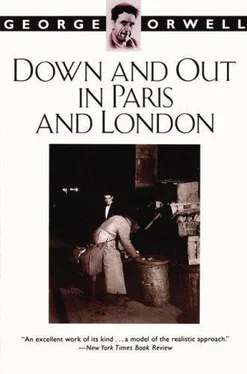George Orwell - Down and Out in Paris and London
Здесь есть возможность читать онлайн «George Orwell - Down and Out in Paris and London» весь текст электронной книги совершенно бесплатно (целиком полную версию без сокращений). В некоторых случаях можно слушать аудио, скачать через торрент в формате fb2 и присутствует краткое содержание. Жанр: Старинная литература, на русском языке. Описание произведения, (предисловие) а так же отзывы посетителей доступны на портале библиотеки ЛибКат.
- Название:Down and Out in Paris and London
- Автор:
- Жанр:
- Год:неизвестен
- ISBN:нет данных
- Рейтинг книги:5 / 5. Голосов: 1
-
Избранное:Добавить в избранное
- Отзывы:
-
Ваша оценка:
- 100
- 1
- 2
- 3
- 4
- 5
Down and Out in Paris and London: краткое содержание, описание и аннотация
Предлагаем к чтению аннотацию, описание, краткое содержание или предисловие (зависит от того, что написал сам автор книги «Down and Out in Paris and London»). Если вы не нашли необходимую информацию о книге — напишите в комментариях, мы постараемся отыскать её.
Down and Out in Paris and London — читать онлайн бесплатно полную книгу (весь текст) целиком
Ниже представлен текст книги, разбитый по страницам. Система сохранения места последней прочитанной страницы, позволяет с удобством читать онлайн бесплатно книгу «Down and Out in Paris and London», без необходимости каждый раз заново искать на чём Вы остановились. Поставьте закладку, и сможете в любой момент перейти на страницу, на которой закончили чтение.
Интервал:
Закладка:
tramps in England. Each day they expend innumerable
foot-pounds of energy-enough to plough thousands of
acres, build miles of road, put up dozens of houses-in
mere, useless walking. Each day they waste between them
possibly ten years of time in staring at cell walls. They cost
the country at least a pound a week a man, and give
nothing in return for it. They go round and round, on an
endless boring game of general post, which is of no use,
and is not even meant to be of any use to any person
whatever. The law keeps this process going, and we have
got so accustomed to it that we are not surprised. But it is
very silly.
Granting the futility of a tramp's life, the question is
whether anything could be done to improve it. Obviously
it would be possible, for instance, to make the casual
wards a little more habitable, and this is actually being
done in some cases. During the last year some of the
casual wards have been improved-beyond recognition, if
the accounts are true-and there is talk of doing the same
to all of them. But this does not go to the heart of the
problem. The problem is how to turn
the tramp from a bored, half alive vagrant into a self-
respecting human being. A mere increase of comfort
cannot do this. Even if the casual wards became positively
luxurious (they never will)' a tramp's life would still be
wasted. He would still be a pauper, cut off from marriage
and home life, and a dead loss to the community. What is
needed is to depauperise him, and this can only be done by
finding him work-not work for the sake of working, but
work of which he can enjoy the benefit. At present, in the
great majority of casual wards, tramps do no work
whatever. At one time they were made to break stones for
their food, but this was stopped when they had broken
enough stone for years ahead and put the stone-breakers
out of work. Nowadays they are kept idle, because there is
seemingly nothing for them to do. Yet there is a fairly
obvious way of making them useful, namely this: Each
workhouse could run a small farm, or at least a kitchen
garden, and every able-bodied tramp who presented
himself could be made to do a sound day's work. The
produce of the farm or garden could be used for feeding
the tramps, and at the worst it would be better than the
filthy diet of bread and margarine and tea. Of course, the
casual wards could never be quite selfsupporting, but they
could go a long way towards it, and the rates would
probably benefit in the long run. It must be remembered
that under the present system tramps are as dead a loss to
the country as they could possibly be, for they do not only
do no work, but they live on a diet that is bound to
undermine their health; the system, therefore, loses lives
as well as money. A
1 In fairness it must be added that a few of the casual wards have been
improved recently, at least from the point of view of sleeping
accommodation. But most of them are the same as ever, and there has
been no real improvement in the food.
scheme which fed them decently, and made them produce
at least a part of their own food, would be worth trying.
It may be objected that a farm or even a garden could
not be run with casual labour. But there is no real reason
why tramps should only stay a day at each casual ward;
they might stay a month or even a year, if there were work
for them to do. The constant circulation of tramps is
something quite artificial. At present a tramp is an
expense to the rates, and the object of each workhouse is
therefore to push him on to the next; hence the rule that he
can stay only one night. If he returns within a month he is
penalised by being confined for a week, and, as this is
much the same as being in prison, naturally he keeps
moving. But if he represented labour to the workhouse,
and the workhouse represented sound food to him, it
would be another matter. The workhouses would develop
into partially self-supporting institutions, and the tramps,
settling down here or there according as they were needed,
would cease to be tramps. They would be doing something
comparatively useful, getting decent food, and living a
settled life. By degrees, if the scheme worked well, they
might even cease to be regarded as paupers, and be able to
marry and take a respectable place in society.
This is only a rough idea, and there are some obvious
objections to it. Nevertheless, it does suggest a way of
improving the status of tramps without piling new burdens
on the rates. And the solution must, in any case, be
something of this kind. For the question is, what to do
with men who are underfed and idle; and the answer-to
make them grow their own food - imposes itself
automatically.
XXXVII
A WORD about the sleeping accommodation open to
a homeless person in London. At present it is impossible
to get a
bed in any non-charitable institution in London for
less than sevenpence a night. If you cannot afford
sevenpence for a bed, you must put up
with one of the following substitutes:
I. The Embankment. Here is the account that Paddy
gave me of sleeping on the Embankment:
"De whole t'ing wid de Embankment is gettin' to sleep
early. You got to be on your bench by eight o'clock,
because dere ain't too many benches and sometimes
dey're all taken. And you got
to try to get to
sleep at once. 'Tis too cold to sleep much after twelve
o'clock, an' de police turns you off at four in de mornin'.
It ain't easy to sleep, dough, wid dem bloody trams flyin'
past your head all de time, an' dem sky-signs across de
river flickin' on an' off in your eyes. De cold's cruel. Dem
as sleeps dere generally wraps demselves
up in newspaper, but it don't do much good. You'd
be bloody lucky if you got t'ree hours' sleep."
I have slept on the Embankment and found that it
corresponded to Paddy's description. It is, however,
much better than not sleeping at all, which is the alter-
native if you spend the night in the streets, elsewhere
than on the Embankment. According to the law in
London, you may sit down for the night, but the police
must move you on if they see you asleep; the Embank
ment and one or two odd corners (there is one behind
the Lyceum Theatre) are special exceptions. This law
is evidently a piece of wilful offensiveness. Its object, so it
is said, is to prevent people from dying of exposure;
but clearly if a man has no home and is going to die of
exposure, die he will, asleep or awake. In Paris there is no
such law. There, people sleep by the score under the Seine
bridges, and in doorways, and on benches in the squares,
and round the ventilating shafts of the Metro, and even
inside the Metro stations. It does no apparent harm. No
one will spend a night in the street if he can possibly help
it, and if he is going to stay out of doors he might as well
be allowed to sleep, if he can.
2. The Twopenny Hangover. This comes a little
higher than the Embankment. At the Twopenny Hang
over, the lodgers sit in a row on a bench; there is a rope
in front of them, and they lean on this as though
leaning over a fence. A man, humorously called the valet,
cuts the rope at five in the morning. I have never
been there myself, but Bozo had been there often. I asked
him whether anyone could possibly sleep in such
Читать дальшеИнтервал:
Закладка:
Похожие книги на «Down and Out in Paris and London»
Представляем Вашему вниманию похожие книги на «Down and Out in Paris and London» списком для выбора. Мы отобрали схожую по названию и смыслу литературу в надежде предоставить читателям больше вариантов отыскать новые, интересные, ещё непрочитанные произведения.
Обсуждение, отзывы о книге «Down and Out in Paris and London» и просто собственные мнения читателей. Оставьте ваши комментарии, напишите, что Вы думаете о произведении, его смысле или главных героях. Укажите что конкретно понравилось, а что нет, и почему Вы так считаете.












